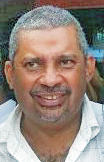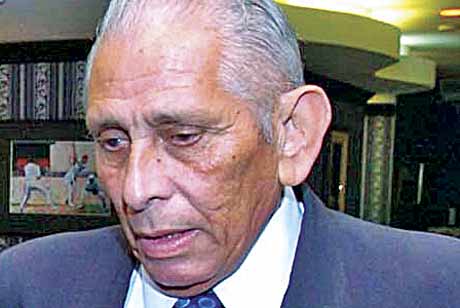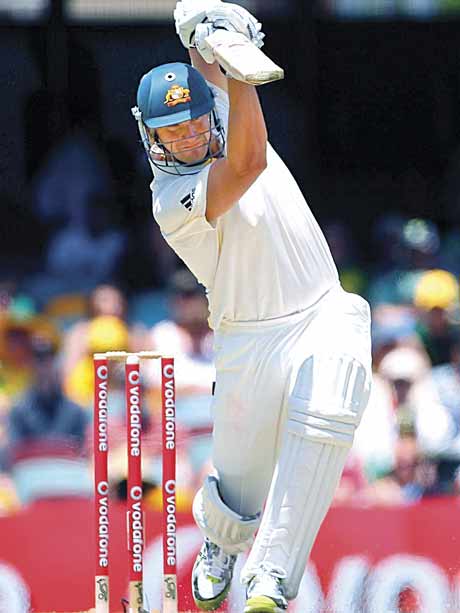January 19, 2011 issue
Cricket
Remembering Joey Carew

Tony McWatt
He was 73.
The statistics will show that Carew played 19 Tests for the West Indies, scoring 1127 runs at an average of 34.15. His highest score and only century in Tests was the 109 he scored against New Zealand in Auckland during the 1969 Tour. Carew was also a very useful leg spin bowler, far more so than as suggested by the 8 Test wickets he took at the very expensive average of 54.62.
The connection between Lara and Carew, is best described by the respected English cricket writer Christopher Martin-Jenkins’ expressed viewpoint:

Lara’s own reaction to the news of Carew’s passing was to describe him as “my mentor, my captain, my coach and my friend.”
My own first memories of Carew were during much of the sixties and early seventies, as the opening batsman in a very strong Trinidad & Tobago Shell Shield team. He and his fellow countrymen, including Bryan and Charlie Davis, Richard De Souza, Alvin Corneal, the Gomes brothers: Sheldon and Randy, Derryck Murray and Bernard Julien, seemed to have developed a particularly healthy appetite for my native Guyana’s bowling, often plundering heavy scores whenever the two countries met in Regional First Class matches.
Superbly led by Carew, Trinidad was a very balanced side. Their formidable batting was supported by a spin-based bowling attack that featured the likes of Willie Rodriguez, Inshan and Imtiaz Ali and Raphick Jumadeen, all of whom were good enough to eventually play Tests for the West Indies. At home especially, on the spinner friendly Queen’s Park Oval pitch, they were often a batsman’s nightmare.
Trinidad’s new ball attack, comprised as it was of the left-arm seamer Julien and the right-arm fast medium pacer Prince Bartholomew, was nothing to sneeze at either. The side also had some superb fielders, especially Sheldon Gomes. Some of his catches in the covers were among the best ever taken in Shell Shield history.
My personal association with Carew started indirectly in 1970. That year my father, the former Guyanese and West Indies wicket-keeper/ batsman Clifford McWatt, was appointed manager of the Guyana team for its away matches in Jamaica and Trinidad.
Despite having such names as Fredericks, Camacho, Butcher, Lloyd and Kallicharran in its lineup, Guyana lost both matches - the first to Jamaica by four wickets; the second, much more heavily, to Trinidad, by an innings and 34 runs. It was interesting to note that the highest individual score in the Trinidad–Guyana match was 143, by none other than one Joey Carew!
Carew played his last match for Trinidad during the 1974 Shell Shield Series. He was undoubtedly one of the most successful captains ever in Regional cricket. His tactical knowledge of the sport and obviously outstanding leadership skills also made him one of the three candidates to be considered for the West Indies captaincy in 1973-74.
The Selectors were at the time looking for a replacement for Rohan Kanhai, whose tenure was about to end. Carew, David Holford and Clive Lloyd were the leading candidates. Lloyd eventually got the nod and subsequently went on to become arguably the most successful captain in West Indies history.
As the son of a former Test player and a very avid fan of West Indies cricket, I was therefore very familiar with Mr Carew and his exploits. Somewhat surprisingly it was only until the early nineties however, that I was first formally introduced to him.
I was at the time working as Executive Director of Ontario Cricket and attending a Test Match at the Queen’s Park Oval for the very first time. It was actually Jimmy Siew, who was serving as the Canadian Cricket Association’s (CCA) President at the time, that introduced me to Carew and several of the other Trinidadian based former West Indies players, many of whom I had known of but never actually met until then.
Whatever it was that I said in my conversations with Carew at that time must have created a very favorable impression. At each of our subsequent meetings during the years that followed, invariably at Test Matches within the Region, he would always enquire as to my involvement with Canadian cricket. He seemed to have formulated an irreversible impression that I possessed both the knowledge and experience to make a meaningful contribution to the development of Canadian cricket. He was always seemingly disappointed by my continued non involvement, the reasons for which are now better left unsaid.
My fondest memory of Joey is of the lengthy discussions we had here in Canada in 1999. That was during the One Day International Friendship Series, between the India, Pakistan and the West Indies that was being played at the Toronto Cricket Club. Joey was Chairman of the West Indies Selectors, Brian Lara was the captain, Clive Lloyd was the manager and I was fortunate and privileged enough to have been appointed by the Series organizers as the team’s Official Liaison Officer.
I spent a fair bit of time with Joey during that Series and our discussions left me with an indelible appreciation of his impressive and unique knowledge of the sport. As many of those who knew him well have observed, Joey Carew could see things on a cricket field that would be forever oblivious to others less knowledgeable.
For me the other endearing quality about Joey that stood out was the deep love and passion for West Indies cricket that we obviously shared. His of course being much, much greater than mine.
That, together with his warm, engaging personality, kind spirit and demonstrated love of laughter and everything else that was good about life made him someone that I now consider myself privileged to have known. He will be sorely missed and always fondly remembered.
Rest In Peace Joey, thanks for all the memories.
by 6 wickets

A career best innings by Shane Watson with the bat enabled Australia to overcome a sloppy fielding effort and beat England in the opening one-day international at the Melbourne Cricket Ground on Sunday.
One of the few Australians to emerge with his reputation intact after the Ashes disaster, Watson's brilliant unbeaten 161 enabled the home side to chase down England's imposing total of 294 from 49.4 overs with five balls to spare.
Fittingly, Watson hit the winning runs from the first ball of the last over, lofting Ajmal Shahzad over long-on for six to take Australia to 297/4.
He and Brad Haddin laid the foundation for the win with a 110-run partnership, although another scratchy innings by captain Michael Clarke threatened to derail the chase.
Clarke put on 103 with Watson for the second wicket, but again looked sadly out of form. He eked out 36 from 57 balls.
But Watson was not going to let his good work go unrewarded again and held the innings together in the latter overs as the tension rose. The solo effort of Watson, dropped on 44 by Jonathan Trott from the bowling of Chris Tremlett at mid-on, spared Australian blushes after a hapless performance in the field.
Kevin Pietersen led the way for England, who won the toss and elected to bat, with 78 from 75 balls including three sixes.
It was England's highest total in a one-day international against Australia in Australia, and also their highest at the MCG.
Just over a month out from their World Cup defence, the Australians offered up dropped catches, missed stumpings, botched run outs and wickets from no-balls, as well as 14 wides.
The rot set in early for the home side when Steve Smith and Brett Lee somehow got in each other's way at the non-striker's end to mess up an elementary run out to give opener Steve Davies (42) a life before he had scored.
With England captain Andrew Strauss on 17, Lee thought he had the left-hander caught on the boundary, only for a review called by umpire Bruce Oxenford to show it was a clear no-ball.
Watson then grassed Davies at short cover when he was on 18 from the bowling of Lee before wicketkeeper Brad Haddin squandered the first of three missed stumpings when Davies was on 24 from the bowling of David Hussey.
The blunders enabled England to get off to a flyer, and the visitors were 90-0 after 12 overs.
Haddin later missed another simple stumping when Strauss was on 48 and facing Xavier Doherty. The keeper made it a hat-trick of missed stumpings when he cost Hussey for a second time, Pietersen the beneficiary when on 37.
The belligerent Englishman made the Aussies pay immediately, lofting Hussey for successive sixes to bring up his 50 and his team's 200.
But in the event Watson's superb knock made up for Australia's bowling woes.
India lead series 2-1
India clinched a dramatic victory over South Africa by 2 wickets thanks to some gritty batting by the tail-enders and a fine half-century by Yusuf Pathan in the third one-day international at Newlands in Cape Town on Tuesday.
Chasing a score of 221 runs to win the Indian top order stuttered, again, as the South Africa pace attack romped through their batting lineup, but Yusuf Pathan played a brilliant innings of 59 runs to drive the visitors home.
Earlier in the match, Francois 'Faf' du Plessis scored a half-century on debut as he and JP Duminy rescued a floundering South African innings against India.
Zaheer Khan with three for 43 and Harbhajan Singh led a superb Indian bowling performance, which was backed up by good fielding.
Harbhajan mesmerised the batsmen, taking two for 23 in nine overs, helped by two diving slip catches by Virat Kohli.
Only 11 boundaries were scored in the South African innings as the batsmen struggled in conditions which were unusually helpful to bowlers.
And last Saturday the tourists pulled off a stunning performance to beat South Africa by 1 run in a cliffhanger of a match in the second one-day international at the Wanderers Stadium in Johannesburg
Chasing a score of only 191 runs, the Proteas made a cautious start but the Indian bowlers made a brilliant comeback by taking a few quick wickets in the middle as South Africa struggled to chase the score.
Earlier, lack of discipline by India's batsmen coupled with a fine spell of fast bowling by Lonwabo Tsotsobe helped South Africa bowl the visitors out for only 190 runs
Tsotsobe finished with impressive figures of 4/22, while Dale Steyn and Morne Morkel took two wickets each as India lost their last seven wickets for just 40 runs.
India lost four wickets for 14 runs in the third powerplay, after managing 54 in the first two.
The left-arm pacer worked his magic after Yuvraj Singh (53 off 68 balls) and Mahendra Singh Dhoni (38 off 61) revived India's innings with a 83-run partnership for the fourth wicket.
From 150/3, they were soon reeling at 184/9, thanks to Tsotsobe who took the wickets of Murali Vijay, Yuvraj, Dhoni and Suresh Raina.
Earlier, on January 12, South Africa's fast bowlers struck early to set up a comprehensive 135-run win in the first ODI against India at Kingsmead.
It was a pretty inglorious innings by India. Only Kohli ever offered enough resistance, with a battling 54. Raina contributed with 32, but no one else did nearly enough. From the very start of the innings the Proteas were able to extract a lot more bounce out of the pitch than the Indians managed and this, and the pace of Steyn and Morkel, was something the Indians couldn't handle. Tsotsobe was excellent with the ball, removing Tendulkar and three others to finish with figures of 4/31. A thoroughly dominating performance from the home side.
Pak take series vs NZ 1-Nil
Set to score 276 runs on the final day of the second test match against New Zealand, Pakistan scored 226 for 5 to draw the match. Having won the first test last week by 10 wickets Pakistan has won the series 1 nil.
They now go into the 4-match One Day series which starts on January 22.
2nd Test, Match Drawn. Scores: NZ 356 (Daniel Vettori 110) & 293; Pakistan 376 (Misbah-ul-Haq 99) & 226/5 (Misbah-ul-Haq 70 n.o).
1st Test, Pakistan won by 10 wickets. Scores: Pakistan 367 (Shafiq 83, Misbah 62, Arnel 4-95) and 21 for 0; New Zealand 275 (Southee 56, McCullum 56, Ahmed 4-63) and 110 (McCullum 35, Rehman 3-24, Gul 3-28).
This is Pakistan's first series win outside the subcontinent since 2003-04.